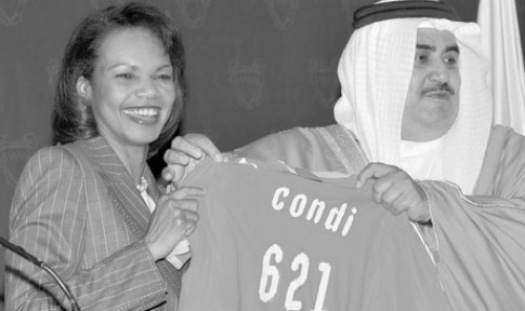
KUWAIT CITY, Kuwait ûIraq’s top diplomat made an unusual personal appeal Monday to mostly Sunni Arab neighbors nervous about the influence and intentions of Shiite Iran.
His message was blunt: Iraq is no Iranian puppet and Arab states should make good on old promises to help Iraq regain its footing. The session came at the invitation of Secretary of State Condoleezza Rice, as the Bush administration pushed twin aims to strengthen Iraq and head off any Iranian ambition to expand its reach in next-door Iraq and beyond.
“When we first started this meeting today we had questions of the ambiguity of the picture in Iraq, the political picture,” Bahrain’s foreign minister, Sheik Hamad bin-Khalifa, told reporters. “The secretary of state and our brother Hoshyar Zebari gave us very good explanations.”
Zebari, the Iraqi foreign minister, won no specific pledge for the diplomatic prize Iraq most seeksûArab embassies and ambassadors posted to Baghdad or Sunni Arab heads of state paying calls on Iraq’s Shiite prime minister.
There were no new promises for relief of Iraq’s billions in Saddam-era debt, much of which is held by Saudi Arabia and Kuwait. The Bush administration says that although Iran has pull inside Iraq, Sunni states nervous about Iran’s spreading influence in the Mideast should not use that as an excuse to give Iraq the cold shoulder.
The Bush administration has tried for years to rally Arab support for a post-Saddam Iraq, both for the boost that regional acceptance would give the fledgling democracy and as a hedge against Iran. Bin-Khalifa sought to downplay Iran’s influence. “We have never seen the Iraqi government as an arm of Iran,” he said.
Arab representatives did invite Iraq to attend some future sessions of the Gulf Cooperation Council, a regional organization that the United States has tried to fashion into a bulwark against Iran. The grouping also excludes Syria, the other country the U.S. considers a Mideast adversary.
“That’s a very good step forward for the reintegration of Iraq into regional affairs,” Rice told a news conference with bin-Khalifa at her side. Rice is on a three-day Mideast trip, and on Sunday visited Baghdad, where she said she was encouraged about progress despite a recent uptick in violence.
She is trying to make the case that much has changed inside Iraq in the last year, owing partly to the presence of additional American troops and also to what she says is growing political cohesion among Iraq’s sectarian and ethnic factions following Prime Minister Nouri al-Maliki’s assault on the Shiite militia loyal to anti- American cleric Muqtada al-Sadr.
“Adjustments are going to have to be made,” in the way Arab states regard Iraq, she said in Baghdad. Al-Maliki told The Associated Press that he would speak frankly to Arab diplomats. “There are countries that support the political process and are opening embassies here,” he said as he headed to Kuwait, referring to unfulfilled pledges from Saudi Arabia and Bahrain.
“We need the others to open embassies here, too. There are some nations that don’t recognize our political process and … are inciting strife,” he continued. “I am bewildered by the position of these nations.”
Arab diplomats say they want to foster long-term stability in Iraq five years after a U.S.-led invasion and occupation many of them opposed, but see little sign that the Shiite-led Iraq government will fully include Sunni Muslims in political power and oil wealth. Arab states also privately note that with fewer than 10 months left in office, the Bush administration has declining leverage over Arab states and al-Maliki’s Baghdad government.
Some blame Bush for opening a Mideast power vacuum that Iran has exploited. The meeting in Manama, Bahrain, concluded with a vague statement that never mentioned either Iran or Iraq by name but made a point of outlining shared principles that the United States says Iran lacks.
“Agreeing that the peace and security of the region are critical to the health of the global economy and represent vital national interests for all, the participants resolve to continue their long-standing cooperation against such threats,” the statement said.
Rice ruled out a direct meeting with Iran’s foreign minister at a second Iraq-themed gathering in Kuwait. Iran and Syria are members of the so-called Iraq neighbors conference, and the forum is one of the rare occasions when U.S. and Iranian representatives interact.
The group’s first meeting last year was overshadowed by the question of whether U.S. and Iranian diplomats would hold their highest-level public meeting in nearly three decades, a possibility the Bush administration said was unlikely but not out of the question.
______ Copyright 2008 Associated Press. All rights reserved. This material may not be published, broadcast, rewritten, or redistributed.